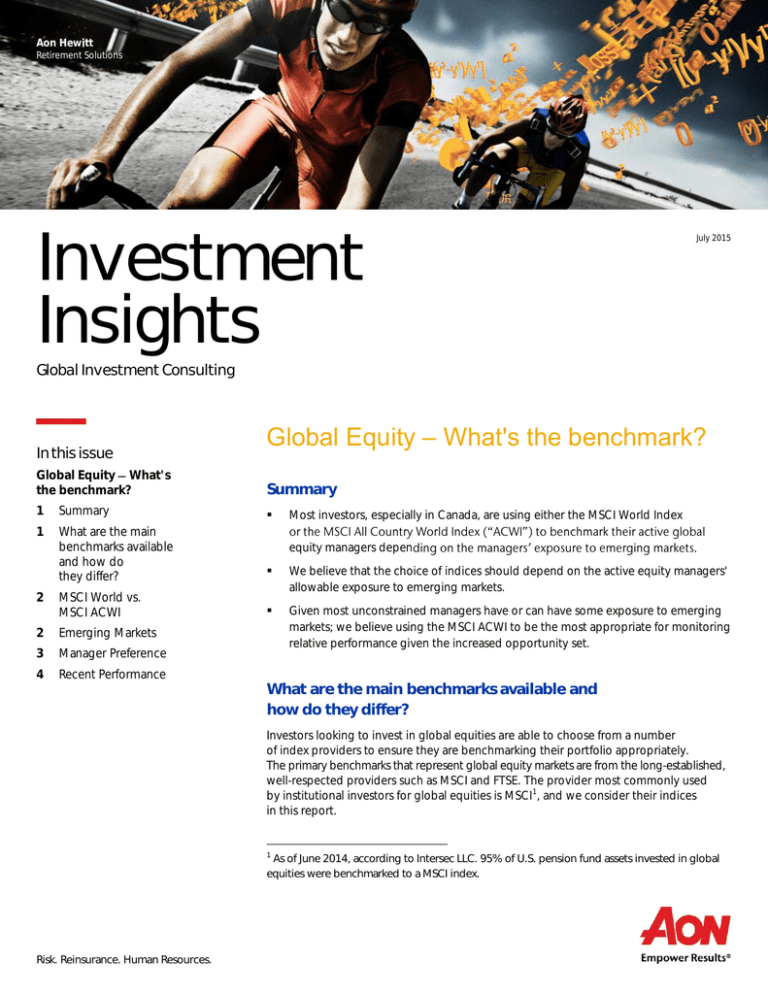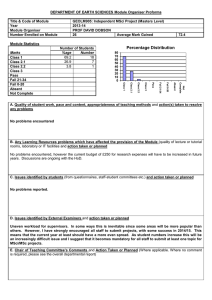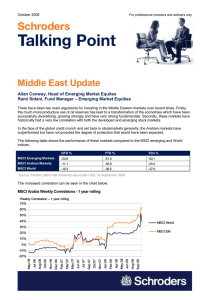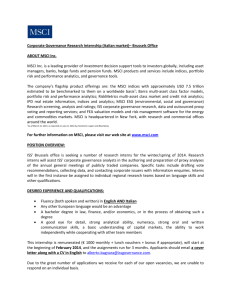
Aon Hewitt
Retirement Solutions
Investment
Insights
July 2015
Global Investment Consulting
In this issue
Global Equity – What's the benchmark?
Global Equity What's
the benchmark?
Summary
1
Summary
1
What are the main
benchmarks available
and how do
they differ?
2
MSCI World vs.
MSCI ACWI
2
Emerging Markets
3
Manager Preference
4
Recent Performance
Most investors, especially in Canada, are using either the MSCI World Index
equity managers depen
We believe that the choice of indices should depend on the active equity managers'
allowable exposure to emerging markets.
Given most unconstrained managers have or can have some exposure to emerging
markets; we believe using the MSCI ACWI to be the most appropriate for monitoring
relative performance given the increased opportunity set.
What are the main benchmarks available and
how do they differ?
Investors looking to invest in global equities are able to choose from a number
of index providers to ensure they are benchmarking their portfolio appropriately.
The primary benchmarks that represent global equity markets are from the long-established,
well-respected providers such as MSCI and FTSE. The provider most commonly used
by institutional investors for global equities is MSCI1, and we consider their indices
in this report.
1
As of June 2014, according to Intersec LLC. 95% of U.S. pension fund assets invested in global
equities were benchmarked to a MSCI index.
Risk. Reinsurance. Human Resources.
MSCI World vs. MSCI ACWI
The two main indices for consideration in the global space are the MSCI World Index and the MSCI ACWI. The MSCI World Index
covers developed markets only, whereas the MSCI ACWI includes both developed and emerging market countries such as China,
Brazil, India, Russia, and Korea. The charts below show the difference in regional weight between the two benchmarks at the end
of March 2015.
MSCI ACWI Index
MSCI World Index
Pacific ex Japan,
4.7%
United
Kingdom, 7.7%
Japan, 8.6%
Europe ex UK,
17.8%
North America,
61.2%
Emerging
Markets, 10.4%
Pacific ex Japan,
4.2%
United
Kingdom, 6.9%
Europe ex UK,
16.0%
Japan, 7.7%
North America,
54.9%
At the end of April, the MSCI World Index contained 1,631 stocks from 23 countries, while the MSCI ACWI contained 2,466 stocks
from 46 countries.
Emerging markets accounted for just 10% of the MSCI ACWI Index's make up at the end of March 2015 and have grown in importance
over the past decade in 2012 emerging markets reached over 13% of the Index. Fifteen years ago emerging markets accounted
for less than 5% of the market cap in the MSCI ACWI Index. Please note that Pacific ex Japan is developed countries only.
Emerging Markets
Emerging markets are not one homogenous economic
or geographic region, but include many diverse countries
across multiple geographic areas. Although the term is loosely
defined, countries that fall into this category are generally
low to middle income nations with a recent record of economic
liberalization, have functioning equity and debt markets, and
have significant potential for both economic growth and capital
market investments by foreigners. Emerging markets account
0% of the equity
market capitalization. Emerging market capitalization reached
approximately US$3.6 trillion in 2008, but fell to US$1.5 trillion
shortly thereafter during the credit crisis. It currently stands
at approximately US$4 trillion.
Investment Insights | Aon Hewitt | July 2015
Overall, Aon Hewitt believes that emerging market equities
are likely to outperform developed market equities over
the longer term, albeit with higher volatility. We recommend
that clients extend their mandates to include a separate allocation
to emerging market equities, or include this region within
their global equity mandates.
2
Manager Preference
One of Aon Hewitt's investment beliefs is that "unconstrained"
management will provide stronger risk-adjusted returns than
passive investment. Within global unconstrained management
we assume that a managers' investment universe can include
emerging markets among other things. Many of the active global
equity managers that we cover make use of the opportunity
to invest in emerging markets with the exceptions being a few
portfolios that are restricted to developed markets only.
Although managers are often benchmarked to the MSCI World
Index, investments in emerging markets can often be significant.
Their investment guidelines can allow between 15% and 20%
of their global equity allocation to be invested in emerging
market equities.
At the end of 2014, the average emerging markets exposure
of the global unconstrained buy-rated managers was 7.15%
and ranged from 0 to 27%. Most often this allocation is a result
of bottom-up stock selection rather than a top down macro call
on emerging markets.
Currently approximately 40% of Aon Hewitt's global unconstrained
buy-rated managers use the MSCI ACWI as their stated benchmark.
We also want to note that most of the active global equity
managers our clients have exposure to are unconstrained in
nature. This means that the portfolio is not constructed relative
highest conviction ideas which may mean that they do not
reference sectors or the regional composition of a benchmark.
The benchmark these managers state is mainly used for
performance comparison over longer time periods. In discussions
with these managers, they generally agree that the MSCI ACWI
may be a better representation of their investible universe.
A few managers will use the FTSE World Index or the FTSE
All World Index as their stated benchmark. There are a few
differences when compared to the MSCI indices, but generally
the performance patterns are very similar. As MSCI is the most
commonly used benchmark provider for global equities,
we favour it over FTSE and other benchmark providers.
In addition, a number of active global equity managers have
already made the transition from using the MSCI World Index
to the MSCI ACWI as their benchmark. This is in recognition that
this benchmark is a better reflection of the investment universe.
There are still however, a significant number of managers that
continue to use the MSCI World Index as their stated benchmark.
This is to a great extent driven by the administrative tasks
associated with changing benchmarks, communicating this
to clients, and gaining their acceptance, rather than the manager
not accepting it as a relevant benchmark. In general, we come
across relatively few managers that are precluded from investing
in emerging markets.
Investment Insights | Aon Hewitt | July 2015
3
Recent Performance
Given the more volatile returns from emerging markets, this can have a strong influence when comparing the two indices.
The relative performance of the MSCI World Index compared to the MSCI ACWI will be lower in some years (e.g. 2009 and 2010
when emerging markets performed strongly), and higher in other years (e.g. 2013 when emerging markets underperformed
developed markets significantly).
The chart below shows the performance for the two benchmarks (in CAD) since 1999. Over this period the MSCI ACWI Index
has outperformed the MSCI World Index by 0.2%.
Comparison of returns to 30 April 2015
Comparison of returns to 30 April 2015
40%
30%
20%
10%
0%
-10%
-20%
-30%
-40%
2015
YTD
MSCI ACWI Index (CAD) 19.5% -11.2%-10.9%-20.2% 9.6% 6.8% 8.1% 20.5% -5.3% -27.7% 14.3% 6.8% -5.1% 13.6% 31.0% 13.5% 10.1%
MSCI World Index (CAD) 18.1% -10.1%-11.6%-20.7% 8.9% 6.4% 6.7% 19.6% -7.5% -25.8% 10.4% 5.9% -3.2% 13.3% 35.2% 14.4% 9.5%
Relative Performance
1.4% -1.1% 0.7% 0.6% 0.7% 0.5% 1.3% 0.9% 2.2% -1.9% 3.9% 0.9% -1.9% 0.3% -4.1% -0.8% 0.6%
1999 2000 2001 2002 2003 2004 2005 2006 2007 2008 2009 2010 2011 2012 2013 2014
1
Year
18.6%
18.5%
0.1%
3
Years
20.1%
21.5%
-1.3%
5
Years
13.6%
14.5%
-1.0%
10
Years
6.6%
6.5%
0.1%
Since
Inc.
3.3%
3.1%
0.2%
It should be noted that while the MSCI ACWI has a slightly higher risk profile, it is not significant over recent periods. Over the past
five years to 30 April 2015 the annualized standard deviation of MSCI ACWI Index has been 9.25% compared to 9.18% for the MSCI
World Index.
Given recent weaker performance from emerging markets, valuations in this region look relatively attractive compared to their developed
counterparts. Overall, as mentioned earlier, Aon Hewitt believes that emerging market equities are likely to outperform developed equities
over the longer term, albeit with higher volatility. We recommend that clients extend their mandates to include a separate allocation
to emerging market equities, or include this region within their global equity mandates.
Investment Insights | Aon Hewitt | July 2015
4
Contact Information
If you would like further information on any of these topics, please contact your Aon Hewitt consultant at info@aonhewitt.com.
Aon Hewitt publishes Investment Insights for the purposes of providing general information. The information in Investment Insights does
not constitute financial, legal, or any specific advice and should not be used as a basis for formulating business decisions.
Investment
Insights contains information that is proprietary to Aon Hewitt and may not be distributed, reproduced, copied or amended without
Aon
About Aon Hewitt
Aon Hewitt empowers organizations and individuals to secure a better future through innovative talent, retirement and health solutions. We advise, design and
execute a wide range of solutions that enable clients to cultivate talent to drive organizational and personal performance and growth, navigate retirement risk
while providing new levels of financial security, and redefine health solutions for greater choice, affordability and wellness. Aon Hewitt is the global leader
in human resource solutions, with over 30,000 professionals in 90 countries serving more than 20,000 clients worldwide. For more information on Aon Hewitt,
please visit aonhewitt.com.
© 2015 Aon Hewitt Inc. All Rights Reserved.
This document contains confidential information and trade secrets protected by copyrights owned by Aon Hewitt. The document is intended to remain strictly confidential and to be used only for your internal needs
and only for the purpose for which it was initially created by Aon Hewitt. No part of this document may be disclosed to any third party or reproduced by any means without the prior written consent of Aon Hewitt.
Risk. Reinsurance. Human Resources.



